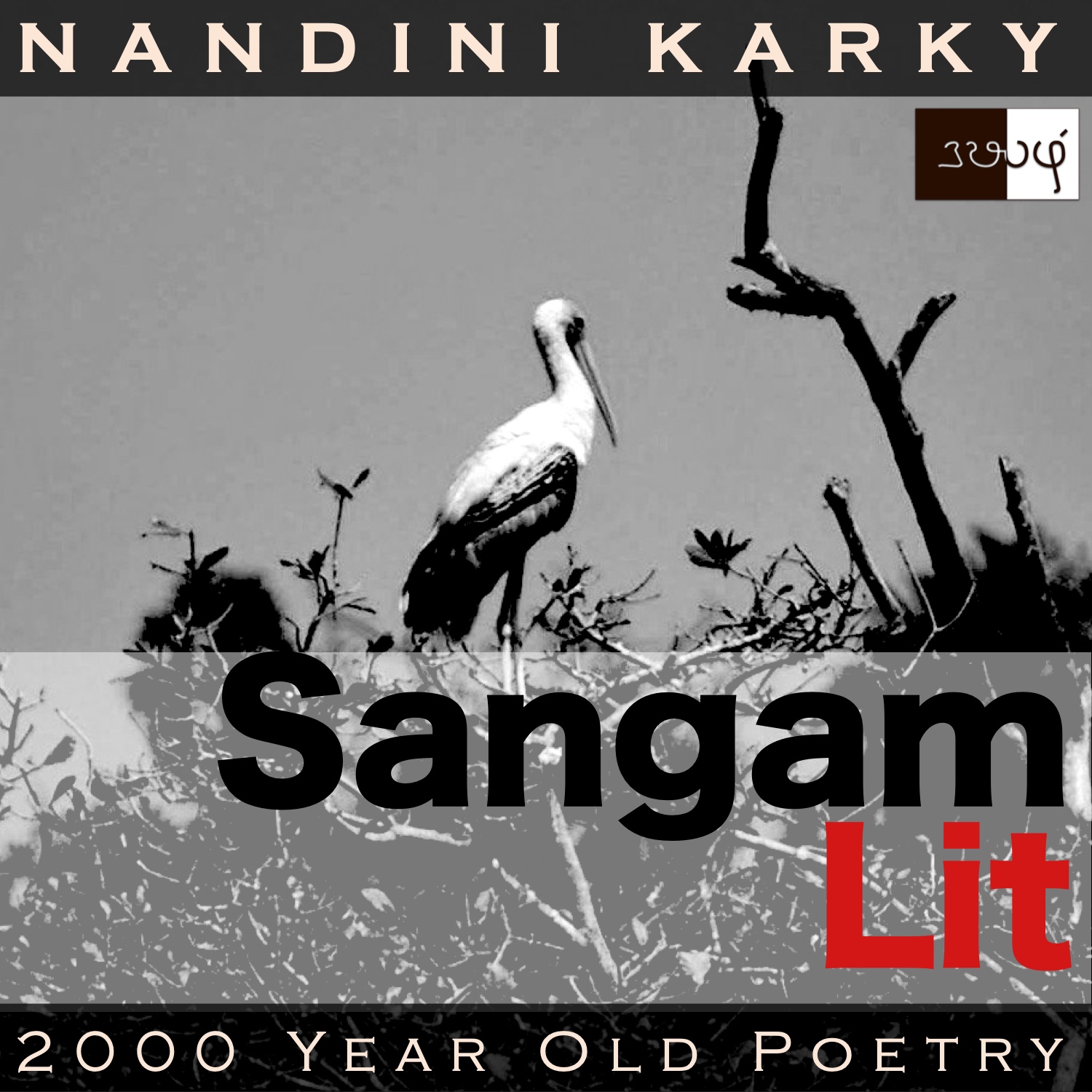Podcast: Play in new window | Download
Subscribe: Apple Podcasts | Spotify | Amazon Music | Android | iHeartRadio | TuneIn | RSS | More

In this episode, we perceive intricate elements from the seashore revealing the inner world, as portrayed in Sangam Literary work, Natrinai 199, penned by Peri Sathanaar. The verse is set in the coastal regions of ‘Neythal’ and speaks in the voice of the lady to the confidante, refusing to accept words of consolation and expressing the angst in her heart.
ஓங்கு மணல் உடுத்த நெடு மாப் பெண்ணை
வீங்கு மடல் குடம்பைப் பைதல் வெண் குருகு,
நள்ளென் யாமத்து, உயவுதோறு உருகி,
அள்ளல் அன்ன என் உள்ளமொடு உள் உடைந்து,
உளெனே-வாழி, தோழி! வளை நீர்க்
கடுஞ் சுறா எறிந்த கொடுந் திமிற் பரதவர்
வாங்கு விசைத் தூண்டில் ஊங்குஊங்கு ஆகி,
வளி பொரக் கற்றை தாஅய், நளி சுடர்,
நீல் நிற விசும்பின் மீனொடு புரைய,
பைபய இமைக்கும் துறைவன்
மெய் தோய் முயக்கம் காணா ஊங்கே!
With the words ‘ஓங்கு மணல் உடுத்த நெடு மாப் பெண்ணை’ meaning ‘tall, dark palm tree amidst the spreading mounds of sand’, the poem transports us to an ancient shore, making the soles of our feet touch the fine grains beneath. Following this, we see ‘குடம்பை’ or ‘nest’, as discussed earlier, perhaps the origin word of the contemporary Tamil word ’குடம்பம்’ meaning ‘family’. The word ‘அள்ளல்’ describes another element of the coastal regions, wherein sand mixed with salty water becomes a ‘mush’. Familiar elements of the sea are seen in ‘சுறா’ which could mean a ‘shark’ or could be a common word for ‘fish’; in ‘கொடுந் திமில்’ meaning ‘curved boats’; in ‘பரதவர்’, the tribe of ‘fishermen’. The rhythmic words ‘ஊங்குஊங்கு’ and ‘பைபய’ both give a sense of something ‘flickering and fading intermittently’. Let’s walk further down this shore to catch more than mere glimpses of this world.
The man and lady had been in a love relationship and rumours spread across town. The man decides to stay away for a while to let the slanderous town settle down. In this period when the man doesn’t visit the lady, she is filled with anguish and suffers with the affliction of pining. The confidante consoles the lady with positive words and yet, the lady finds no solace. To the confidante, she replies, “Amidst the towering sands, soars the tall, dark palm tree and on its wide open leaves, a white seabird worries in its nest. In the midnight hour, when it cries out aloud with suffering, my mind turns a mire and breaks within! Such is my state, O friend. May you live long! I suffer thus, as I do not relish the embrace of the lord, in whose land, fishermen hunt for speeding sharks, sailing in the surrounding waters with curved boats. Amidst the fishing nets thrown out, the sea breeze blows intermittently and makes the flame in the lamps, flicker on and off, like the stars in the dark blue sky.” With these words, the lady expresses the inconsolable pain in her heart and the way her life seems to quiver, as the man continues to stay away.
Now, a dive into the sea to gather the hidden pearls in this verse! The lady starts by describing an external event in the shore and the effect this has, on her. Mounds of sand spread on this land and tall, dark palm trees seem to soar above. In one such tree, amidst the bushy leaves, a seabird’s nest is seen. Looking closer, we see that this bird is in much suffering. The lady says it’s at midnight the pain becomes intense for the bird lets out a cry, missing its mate. It’s at that time, her mind seems to turn into a mire, that seems to pull her down to the deep. She explains that such is her state because the man doesn’t return to grace her with an embrace. Then she describes the domain of the man. She mentions a hunt in the sea by fishermen on curved boats, speeding behind sharks to throw their nets. As their midnight hunt continues, the flame in their lamps seems to flutter and appear as if it were the stars in the sky above. Although these are lamps held close, their life seems to be so fragile that they glow with the softness of the faraway stars.
Two exquisite images from the land hemmed by waves! The first one serves as a simile by portraying the pain in the lady in parallel to the seabird that cries for its missing mate. The second image of the shuddering lamps in the hands of fishermen is a metaphor for the way the lady’s life seems to shiver as the storm of parting attacks her. And, yet she holds on to life, just the way those lamps continue to glow, gently like the stars. Although it’s a poem expressing pain, there’s a sliver of positivity in the final thought that the lady continues to live with the hope the man will return, even as the parting makes her life tremble in agony. In that, lies the gentle message, as old as the twinkling stars in the sky, bidding us to keep glowing, no matter how the gale assails!




Share your thoughts...